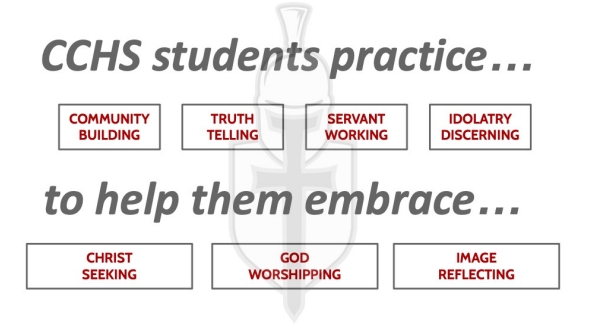The primary goal of Christian education is the formation of peculiar people who desire the Kingdom of God and thus undertake their life’s expression of that desire. -James K.A. Smith
After a brief detour last month to reiterate the argument for a distinctly Christian model of education, we return again to our introduction of the Teaching for Transformation initiative that CCHS is in the process of adopting. Among the many appealing features of this framework is its emphasis on active learning via “discipleship habits” they call Throughlines. Our staff have been working hard all year to develop Throughlines that are specific to our school community and we are excited to officially announce them as follows:
■ Community Building
■ Truth Telling
■ Servant Working
■ Idolatry Discerning
■ Christ Seeking
■ God Worshipping
■ Image Reflecting
The goal is to incorporate these habits into our existing curriculum in order to reinforce the redemptive nature of our academic program. When students are invited into the learning process by means of personal application, the result is a transformative experience that not only changes them but also promotes the highest levels of academic excellence. The underlying concept to this model is built on the premise that what we do has a uniquely formative effect on who we become. This concept is perhaps best articulated in James K.A. Smith’s 2016 publication You Are What You Love where he makes the argument that our daily habits preach a vision of the good life to our souls:
Look at your daily, weekly, monthly, and annual routines. What are the things you do that do something to you? What are the secular liturgies in your life? What vision of the good life is carried in those liturgies? What story is embedded in those cultural practices? What kind of person do they want you to become? To what kingdom are these rituals aimed? What does this cultural institution want you to love? (p.55)
If we’re being honest, most of us live our lives on autopilot and we end up not looking any different from the rest of the world. But if we took the time to intentionally cultivate new routines that were aimed at acting in harmony with God’s purposes for our lives, I suspect that the results would be profound. These Throughlines, therefore, represent counter-cultural habits that will result in forming the kind of peculiar people Smith describes in the above quote– people who are different not merely for the sake of novelty, but in a way that reflects Paul’s command in Romans 12:2 to not be conformed to this world but to be transformed by the renewing of our minds.
You will notice as you review the above list that these Throughlines are not created equal. This is by design. The first four in particular are intended to be practices that anyone can do; one does not need to be a Christian to meaningfully participate in community building or truth telling. Over time, however, our hope is that these practices will prompt students to embrace the more foundational goal of Christian education, such as Christ seeking and God worshipping.
With that in mind, we’ve developed the below graphic to illustrate how we envision these Throughlines will be implemented in the daily lives of students at CCHS. Our faculty is currently hard at work incorporating these habits into our curriculum guides in the hopes of developing opportunities to apply them by doing real work that meets the real needs of real people in our community in what TfT calls Formational Learning Experiences. At the risk of overstating it, I am convinced that this could be one of the most significant developments for the academic program at CCHS and we look forward to seeing how God will use these efforts to do good for others and bring glory to Himself.
